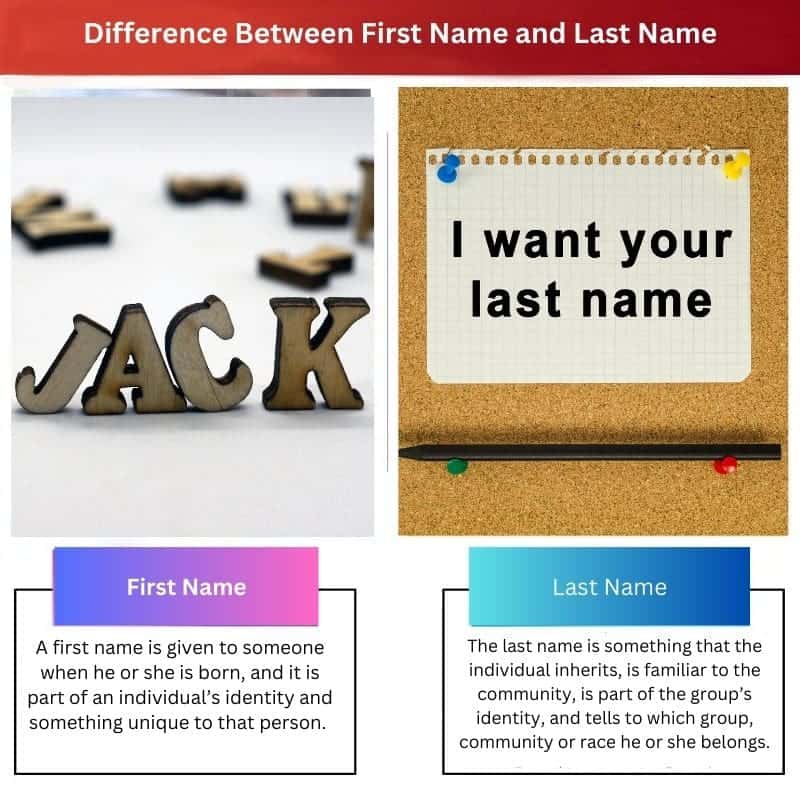The first name is a given name which is sometimes known as a Forename and is part of a personal name that tells or identifies a person and differentiates him or her from other persons or members of the group (a group can be a family or community).
Key Takeaways
- A first name, also known as a given name or personal name, is an individual’s primary name and identifies the person on a personal level.
- A last name, also known as a family name or surname, is shared by family members and signifies lineage or ancestry.
- First and last names are components of a person’s full name, but first names are personal names, while last names are family names that indicate lineage.
First Name vs Last Name
The difference between First names and Last names is their position and the sense they represent. The First name represents their individuality and identity, but the Last name is something the person inherits from his or her family.

The first name is given to the person when he or she is born. In contrast, the Last name is something that is inherited by the person and is something common to the group, family, or community, like each person in a family has a common name that their last name.
For example, “Lilly Rose Depp is the daughter of Johnny Depp” now, while they share something familiar that is their last name which is their family name and is common to both but their first name is different to both from them
and is a part of their individuality and is part of their identity; this also tells us that “Johnny” and “Lilly Rose” are father and daughter and are different ones, and in a general sense, it is a representation of a person.
While the last name is also called the surname first name is the forename. Depending upon the culture, community, region and race, last names differ, and their sense also changes from race to race.
In most Asian countries, it also indicates the caste of a person or race to which he or she belongs, while in European countries, it is, on a broad scale, a mere title and might not represent the race.
Both are allowed to be changed in government norms, while there is a common practice for a woman to officially change her last name from her family name to her husband’s family. They both make Full names (First + Last ).
Comparison Table
| Parameters of Comparison | First Name | Last Name |
|---|---|---|
| Meaning | Individual’s name | Family name |
| Formality | Informal/formal | Formal |
| positioning | First in western and last in Asian culture | Last in western and first in Asian culture |
| Example: Michael Phelps | Michael | Phelps |
| Lana del Rey | Lana | Del Rey |
What is First Name?
A first name is given to someone when he or she is born, and it is part of an individual’s identity and something unique to that person. It is also called Forename, and in a single family, it is different to a different person and will be part of his identity.
Muhammad is thought to be the most common name in the world. Generally, the first name can also tell about someone’s sex, which the last name cannot tell; this is unique to the first name.
First is a part of the uniqueness that the individual should hold or might be holding; it is a quality of the person he or she should have and is given to him or her.
For example, Kento Momota has his first name as “Kento”, which means a strong person; in other words, the first name is a meaningful quality or an adjective, while it is not always accurate in the last name.
Cultural Significance of First Names
First Names in Western Cultures
In Western cultures, first names, also known as given names or forenames, are chosen by parents when a child is born or shortly thereafter. These names are vital in shaping an individual’s identity and connections within their family and community.
Various factors, such as religion, family traditions, or popular trends at birth can influence first names in Western cultures. Parents select a name that reflects their values, holds sentimental meaning, or has a connection to a family member.
For example, in British naming traditions, the first son is named after the father’s father, and the second is named after the mother’s father. This practice helps reinforce generational connections and maintain strong family ties. First names can also be influenced by cultural and historical events, popular figures, literary works, or global happenings.
In many Western countries, it is also customary to include a middle name. This may be derived from a parent’s or grandparent’s name or serve as an additional given name with personal significance.
First Names in Eastern Cultures
In Eastern cultures, first names are significant and based on cultural beliefs, personal values, and family history. In some cultures, names directly connect to an individual’s destiny and personality. As a result, more importance is placed on selecting a harmonious and auspicious name.
In Chinese culture, for example, names are chosen based on numerous factors, such as the child’s birth date and time, five elements (wood, fire, earth, metal, and water), and the characters’ meanings. It is believed that the name can impact one’s life, fortune, and luck.
Parents may consult with a fortune-teller or a professional name selection service to ensure their child’s name is favorable and aligns with the family’s hopes and aspirations.
Similarly, in Hindu cultures, names are derived from sacred texts and are chosen based on their spiritual aspects and ability to evoke positive energy. Parents may consult with priests or family elders to select a thoughtful and harmonious name that reflects the child’s individuality, while also honoring tradition and divine qualities.
First Name Preferences
When choosing a first name for yourself or your child, it is essential to be aware of the psychological impacts it may have. Your first name can influence your personality and how others perceive you. A study led by US psychologist Jean Twenge found that people who didn’t like their own names were more likely to be dissatisfied with life in general, even after controlling for family background and other factors.
Names that are easy to pronounce and spell tend to have positive associations, while those that are more challenging might be linked to unfavorable opinions from others.
Changing First Name
Changing your first name can be a personal decision for various reasons such as marriage, divorce, or simply preferring a different name. To legally change your first name, you’ll need to follow the process dictated by the laws in your specific state or country.
This process involves proving your residency, gathering supporting evidence (such as your birth certificate, social security card, driver’s license, and photo identification), and filing a Petition for Change of Name. Once the name change is approved, you must update your identification documents, bank accounts, and other records.

What is Last Name?
The last name is something that the individual inherits, is familiar to the community, is part of the group’s identity, and tells to which group, community or race he or she belongs.
In most Asian countries, it also indicates the caste of a person or race to which he or she belongs, while in European countries, it is, on a broad scale, a mere title and might not represent the race.
While the history of the last name is not so old, according to various studies, it is a practice that started around the 15th century.
While the practice of providing someone her or his first name cannot be decided when it started, it is very ancient, as old as human history.
In most Asian countries, the last name represents the roots of the family, their history, their failures and achievement and who the family is and their norms, but the first name is given to someone
who they should be, and their name has a profound meaning that should always remain a part of their life and lead the way.
Cultural Significance of Last Names
Last Names in Western Cultures
In Western cultures, the last name, the surname or family name, represents one’s family lineage. It is inherited from one’s parents and shared with other immediate family members. In American naming traditions, for example, the family name comes after the given name, serving as a link to a person’s ancestors, and possibly hinting at their occupation, geographical origin, or social status.
In early American settlements, British naming traditions were highly influential, with patterns such as the first son being named after the paternal grandfather, and the second son after the maternal grandfather.
Last Names in Eastern Cultures
The cultural significance of last names in Eastern cultures differs from that of Western cultures. In some Asian cultures, the family name is placed at the beginning, followed by the given name. This placement emphasizes the importance of family and lineage. For instance, in Chinese, Japanese, and Korean societies, the family name precedes the given name, reflecting the collectivist values that prioritize the family as a unit.
Moreover, in certain regions, last names may denote one’s social class, clan affiliation, or honorific titles, underlining the importance of heritage and social dynamics. Although specific naming conventions may vary across cultures, the common theme is that last names carry historical and cultural significance.
Last Name Preferences
Your last name, on the other hand, serves as a connection to your family history and ancestry. While first names are the focus of individual identity, last names can carry a weight of collective identity, representing familial lineage and social ties. Sometimes, a last name change can indicate a significant life event, such as marriage, adoption, or establishing a new identity altogether.
Arai and Thoursie from Stockholm University found that name changes, such as adopting more local-sounding surnames, could substantially improve earnings for immigrants, signifying the influence of last names on social and economic integration. Furthermore, research also suggests that easier-to-pronounce last names may result in more positive evaluations from others, which can impact various aspects of your personal and professional life.
Changing Last Name
When it comes to changing your last name, different scenarios might prompt this change. Common situations include marriage, divorce, or adoption. In the United States, around 97% of married couples traditionally pass down only the father’s last name to their children. However, you and your partner may adopt a different naming convention, like combining or hyphenating last names.
Again, the process for legally changing your last name will depend on your state or country’s laws. Generally, the same requirements apply as when changing your first name. Be prepared to prove your residency, gather supporting documents, and file a Petition for Change of Name. Once your name change is approved, ensure that you update all personal records and identification documents accordingly.

Main Differences Between First Name and Last Names
- The main difference is the sense they are used, while the first name represents someone’s individuality and represents his or her identity.
- The last name is the name someone gets from his or her family, representing a person’s community, race, and family.
- Their position also has significant differences between them. In western culture, they have the same meaning as their name, but in Asian countries, their sense is the same, but their positions are opposite to their name.
- The first name is given on some quality that the person might have or should have, but the last name is the family’s title.
- The first name, on a broad scale, can tell you the sex of a person, but the last is the thing that can do that.
Case Studies: Impact of First vs Last Names
Job Applications and Names
In the professional world, your name might affect how employers and colleagues perceive you. Studies have shown that names can significantly influence an individual’s job chances. In one notable study, researchers at UCLA found that people with “white-sounding” names were more likely to be called for interviews compared to those with “black-sounding” names, even when qualifications and experience were the same.
Since job applications rely on first impressions, your first and last names can affect your career opportunities. One phenomenon, known as the “Last Name Effect”, suggests that individuals with earlier alphabetically-ordered last names are more likely to be successful in their careers. This might be because their names appear earlier on lists or in alphabetical orders, leading to more attention and potentially better opportunities.
Social Dynamics and Names
Social dynamics can also be shaped by the names we bear. Research has shown that certain names can be associated with specific stereotypes. This can lead to unconscious biases in people’s perception of others based on their names. For example, individuals might assume those with certain names to be more intelligent, friendly, or aggressive, merely based on the name itself and not personal experience or interaction.
In addition to these perceived stereotypes, your name might also be a source of identity and a connection to cultural or ethnic background. In some cases, this can lead to feelings of pride and belonging, while in other instances it might invite discrimination or exclusion from certain groups.

- https://www.jabfm.org/content/5/5/517.short
- https://www.sciencedirect.com/science/article/pii/0010440X84900208

The article offers an expansive and profound exploration of the intricate dimensions of naming conventions, delving deeply into the cultural, historical, and familial aspects.
Certainly. The comprehensive nature of the article’s analysis makes it an invaluable resource for understanding the multifaceted significance of naming traditions.
While the article provides a comprehensive overview, its presentation could be enhanced through the incorporation of real-world examples to illustrate the cultural and familial influences on naming traditions.
I share the same sentiment. Concrete examples would undoubtedly enrich the reader’s understanding of the practical implications of naming conventions.
The article provides an intriguing exploration of the cultural and familial implications of first names and last names. It offers valuable insights into the diversity of naming conventions.
Absolutely, the piece effectively captures the nuanced and multifaceted nature of naming practices, shedding light on their cultural and historical dynamics.
An absolutely eye-opening insight into the cultural, social, and personal significance of first and last names.
While the article provides valuable information, it could benefit from an even deeper exploration of the societal and historical contexts that shape naming conventions.
I understand your point. A more extensive analysis of the societal and historical influences on naming conventions could enhance the depth of the article.
Indeed, delving further into the historical and social dimensions of naming traditions would offer a more comprehensive understanding of their significance.
An engaging and informative piece that encapsulates the rich complexities of naming traditions across different cultures. Well-researched and thought-provoking.
I completely agree. The depth and breadth of the article’s exploration of naming practices make it an enlightening and intellectually stimulating read.
An insightful and comprehensive examination of naming practices, which provides a deeper understanding of the cultural, historical, and familial dimensions of first names and last names.
Absolutely. The inherent complexities and nuances of naming conventions are effectively unpacked in this enlightening and intellectually stimulating article.
Indeed, the article offers a nuanced and thought-provoking exploration of naming traditions, underscoring the multifaceted significances of first names and last names.
An insightful and comprehensive analysis of the cultural, historical, and personal significance of first names and last names. Well-done!
The examination of the differences between first names and last names is highly informative and thought-provoking. It provides a new perspective on naming conventions.
Absolutely, the article provides a detailed and in-depth understanding of the importance of first and last names within different cultures.
A fascinating exploration of the cultural and familial significance of naming conventions. The comparisons between Western and Asian naming practices shed light on the diversity of traditions.
I couldn’t agree more. The article effectively highlights the multifaceted nature of naming traditions and their impact on familial connections.
The section on ‘Cultural Significance of First Names’ is particularly intriguing, offering valuable insights into the complexities of naming practices across different cultures.
A compelling exposition of the complexities and diversity of naming traditions, offering valuable insights into the cultural and familial dynamics of first names and last names.
Absolutely. The depth and breadth of the article’s analysis yield a thorough understanding of the cultural and familial implications of first and last names.
I concur. The article provides a rich and profound exploration of naming conventions, illuminating the interplay of cultural, historical, and social factors.